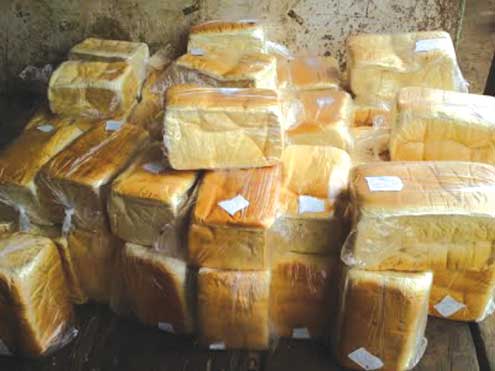A professor of food chemistry at Ajayi Crowther University, Oyo State, Oladunni Akinnawo has alerted the Federal Government and other relevant agencies of how bakers have continued the use of a banned substance, potassium bromate in baking bread.
Recall that the National Agency for Food, Drugs Administration and Control, NAFDAC, had earlier warned bakeries to desist from using the substance as it is certified to cause cancer.
As a sign of obedience to the NAFDAC rule, most bakers now inscribe the ‘bromate free’ sign boldly on their packaged bread.
However, a recent study by Akinnawo in Ibadan and Oyo towns, for instance, indicated the use of potassium bromate in 72 per cent of bread samples.
Akinnawo stated this on Thursday while delivering the 9th inaugural lecture of the university, according to a statement issued by the university spokesperson, Alvan Ewuzie.
The lecturer called on NAFDAC to intensify enlightenment and enforcement of the ban in order to safeguard consumers’ lives.
She said the substance, which is added to bread dough to strengthen it, increase loaf volume, and improve the texture, can cause sore throat, abdominal pains, diarrhea, nausea, and vomiting. In extreme cases, it could lead to kidney failure and heart failure, she said.
She added that studies have linked the compound in the chemical to cancer in experimental animals and humans and has been classified as a potential carcinogen.
Mrs. Akinnawo, who teaches in the Faculty of Natural Sciences, Ajayi Crowther University, urged Nigerians to shun certain contemporary food practices like uncontrolled use of additives in making snacks in fast food houses, which she said was responsible for most cases of overweight in adults and obesity in adolescents.
She condemned the practice of using polyethylene wrappers to steam moi-moi (beans pudding), saying it was dangerous to health. The practice, she said, releases dioxins and other carcinogenic toxins into the food, during the process of cooking.
According to her, wrapping of moi-moi in leaves, while cooking it, was better than wrapping it in nylon or other materials. She said the leaves preserve the taste and make it more hygienic.
Mrs. Akinnawo, who advised Nigerians to diversify their food choices rather than being restricted to garri, fufu, amala, and rice, acknowledged that rice production has been on the rise in the country. But said the federal government could do more than that.
“Rice is not the only food that Nigerians eat and need,” she said. “Just as the government is diversifying the economy, there is need to diversify crop species for production and consumption.
“Emphasis should be on producing more of food crops like maize, yams, fruits, leafy fruits and vegetables…. There is need to enlarge our food basket to increase most of crop species, a large variety of diets can be available to promote a good nutrition and encourage optimal health,” she said.
The lecture was attended by scholars from Ajayi Crowther University and the University of Ibadan. It was chaired by the Vice Chancellor of Ajayi Crowther University, Dapo Asaju.

